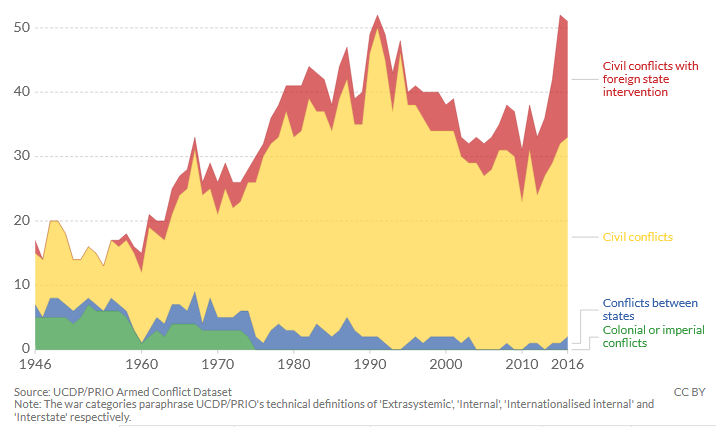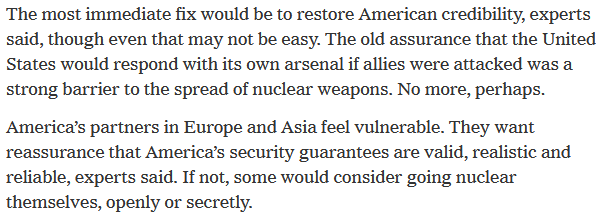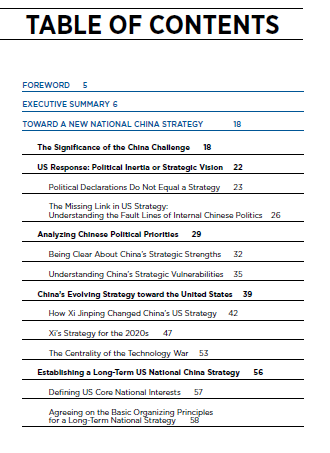
Possible 🇺🇸 arms sales restrictions on 🇸🇦 raises a question: Is there such a thing as a "defensive weapon"? Can some weapons ONLY be used to STOP attacks?
International Relations scholars are (mostly) unanimous: No
[THREAD]
reuters.com/article/usa-sa…
International Relations scholars are (mostly) unanimous: No
[THREAD]
reuters.com/article/usa-sa…
To be clear, it is possible that a weapon will only be USED to stop attacks, not attack others.
After all, that's the heart of "self-defense" clause in Article 51 of the UN Charter
legal.un.org/repertory/art5…
After all, that's the heart of "self-defense" clause in Article 51 of the UN Charter
legal.un.org/repertory/art5…

Also, it is possible that a state's military will have a "defensive strategy" -- i.e. non-expansionist -- rather than an "offensive strategy" -- i.e. expansionist.
Indeed, that is a core part of the theory in my book "Arguing About Alliances"
cornellpress.cornell.edu/book/978150174…
Indeed, that is a core part of the theory in my book "Arguing About Alliances"
cornellpress.cornell.edu/book/978150174…
Where the criticism comes in -- and this is now pretty much the consensus view among international relations scholars -- is that there is no such thing as a "purely defensive" weapon.
Early scholarship on the "offensive-defensive balance" claimed that an "offensive v defensive" distinction could be made regarding the nature of weapons.
Consider Jervis' classic @World_Pol piece "Cooperation Under the Security Dilemma"
cambridge.org/core/journals/…
Consider Jervis' classic @World_Pol piece "Cooperation Under the Security Dilemma"
cambridge.org/core/journals/…
So far, so good. The key is whether there are certain weapons that are usable only to "move forward, destroy, and take"?
Jervis says "yes" (the "or" is key):
Jervis says "yes" (the "or" is key):

He elaborates by stating "the other major determinant of the offense-defense balance is technology" because 👇 

Other scholars soon disagreed.
They included...
They included...
... Mearsheimer in his 1983 book "Conventional Deterrence"...
amazon.com/Conventional-D…
amazon.com/Conventional-D…
Let's focus on the Levy piece. He points out that the key is whether a weapon "disproportionately" contributes to either defense or offense 

The problem, Levy points out, is that a weapon, even an aggregation of a weapon, has to be considered along with its intended use & doctrine.
He uses tanks and Napoleon to make his point.
He uses tanks and Napoleon to make his point.

Or consider forts (or even missile defense systems)
- On the one hand, forts protect.
- On the other hand, if forts protect you from counter-attack, then you could be more inclined to LAUNCH an attack.
- On the one hand, forts protect.
- On the other hand, if forts protect you from counter-attack, then you could be more inclined to LAUNCH an attack.

Even subsequent work seeking to defend (no pun intended) "offense-defense theory" acknowledged that the characteristic of the weapon was not highly important to the theory.
This piece ultimately defends "offense-defense theory" as a useful way of explaining global trends in conflict. But even here, "technology" is defined so that "tools" are just one element of technology 

How the various elements of "technology" interrelate is what produces either "offensive dominance" or "defensive dominance". She summarizes her coding in the below table. 

Recent work has sought to extend the idea of offensive-defensive balance into the cyber realm.
See, for example, @rebeccamslayton in @Journal_IS
mitpressjournals.org/doi/full/10.11…
See, for example, @rebeccamslayton in @Journal_IS
mitpressjournals.org/doi/full/10.11…

To be clear, the above offers just a sample of the huge body of work on both offensive-defensive theory in general and military technology specifically.
Both of those could probably be their own threads!
Both of those could probably be their own threads!
But what the above pieces show is that labeling a weapon as "defensive" or "offensive" is not a useful distinction (even for those who are offensive-defensive theorists).
Like many aspects of international politics, when asked, "is a weapon defensive?" the answer is "no, because it depends!"
[END]
[END]
• • •
Missing some Tweet in this thread? You can try to
force a refresh













